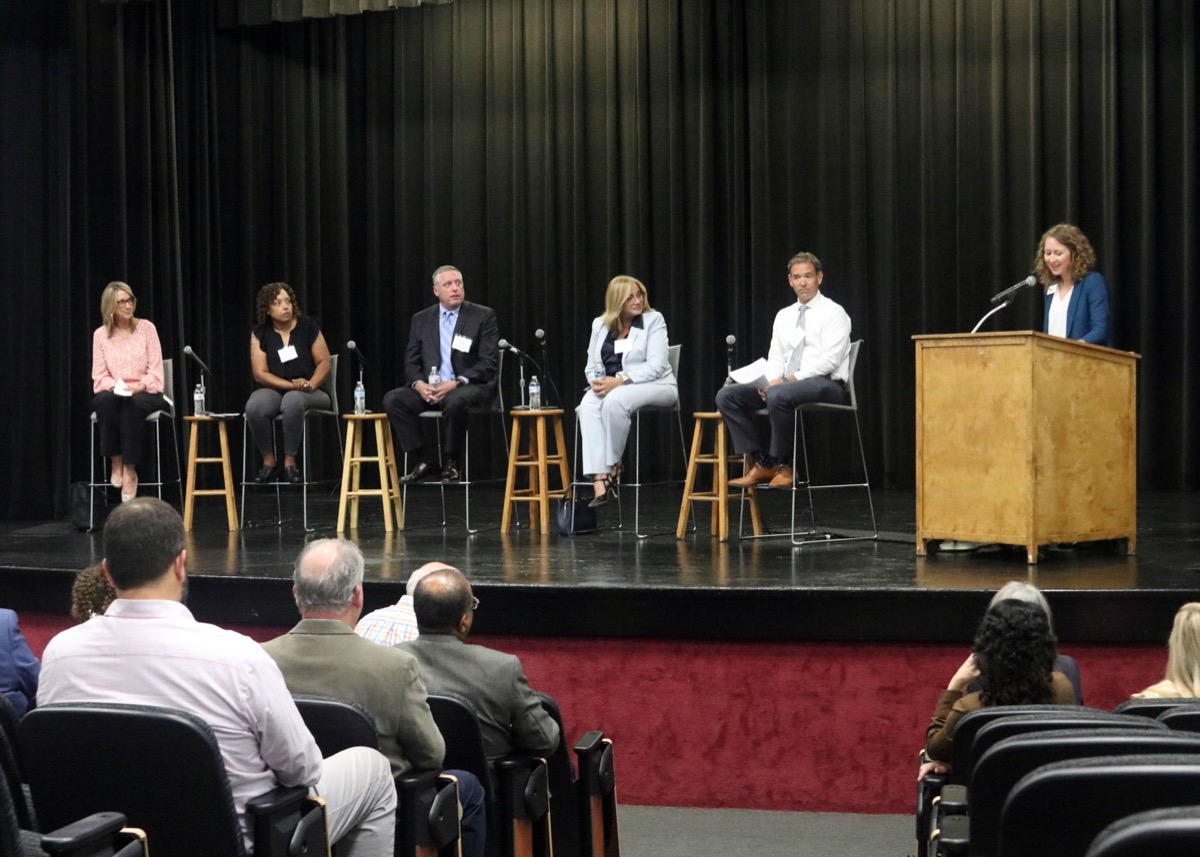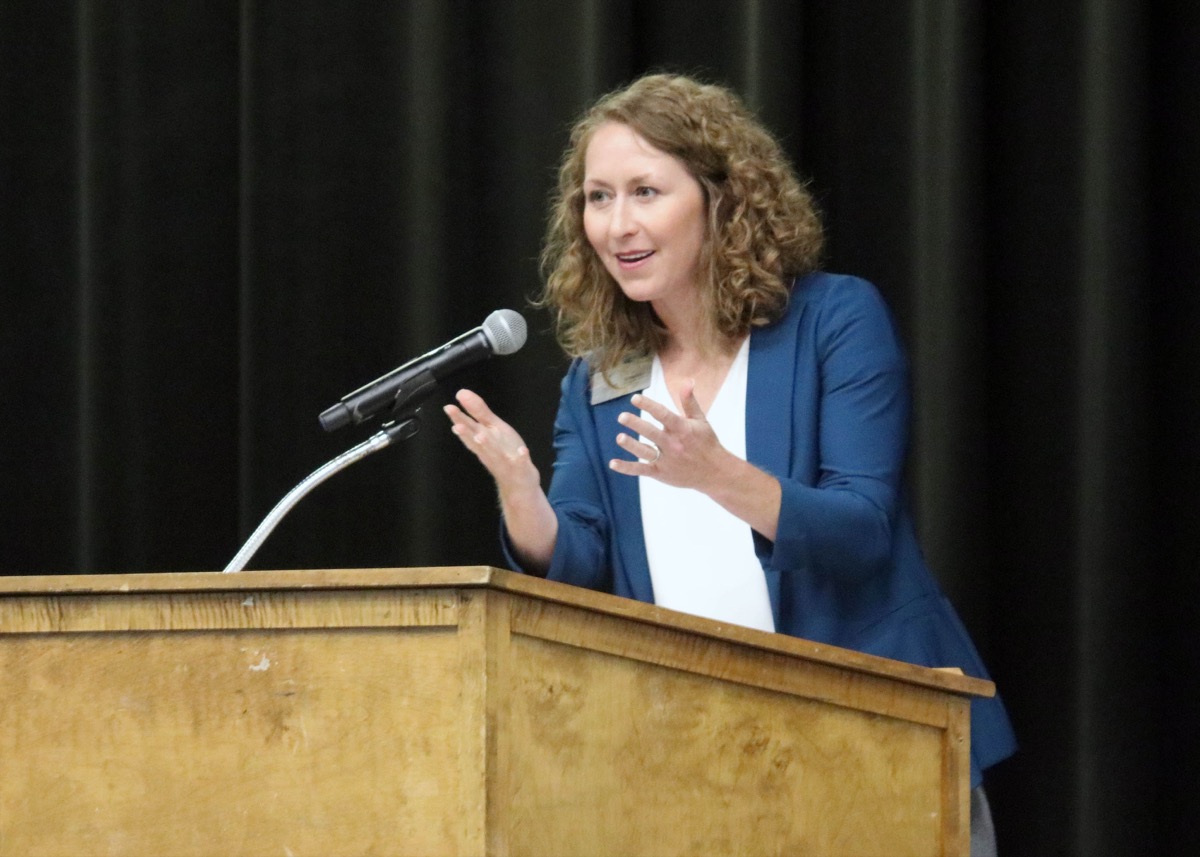College News
CCCC hosts 'Career Paths in Biotech' networking forum

click image to enlarge ⊗
Industry panelists shared wide-ranging insights at the "Career Paths in Biotech" networking forum ... (more)

click image to enlarge ⊗
Dr. Lisa Smelser is Central Carolina Community College Biotechnology Department Chair.

click image to enlarge ⊗
These individuals share a photo opportunity at the Central Carolina Community College Biotech networking ... (more)

click image to enlarge ⊗
The Central Carolina Community College Biotech networking event included time for networking with ... (more)
08.02.2024 • Admin, Faculty & Staff • College General • College & Community
SANFORD, N.C. - Essential advice was on the agenda when biopharmaceutical professionals gathered on July 30 to meet Central Carolina Community College students one-on-one and provide expert guidance for breaking into the rapidly expanding industry. Everything from developing skills needed to land that first, entry-level job to eventually making the transition into management, developing professional networks and even mentoring younger employees.
But as industry panelists shared wide-ranging insights at this second-annual "Career Paths in Biotech" networking forum, a central theme started to emerge. Success in the biopharmaceutical industry is easily within your grasp, but it all depends on two things: taking responsibility for your own career and moving past any initial fear or failure.
Moderator Brad Mickey, executive director and manufacturing and operations site head for Astellas Gene Therapies in Sanford, led his five-member panel through a series of initial questions, beginning with what companies look for when hiring entry-level employees.
Panelists mentioned a few technical skills that would be helpful, but most of the emphasis was placed on personal skills.
Dr. LaDonna Buie, manufacturing supervisor for Pfizer, mentioned problem solving, working well with others and being willing to learn, which came up time and time again as part of that recurring theme -- taking responsibility for your own career.
In fact, when asked later about how current employees could build their careers, Buie suggested taking the initiative to find a mentor and made that recurring point again: "You're in charge of your career," she said. "You've got to make decisions about what's best for you and how you want to go forward, what you want to do in your career."
That's exactly how Lee Grimes approached the biopharmaceutical industry from Day One. He's now associate director of downstream manufacturing for FUJIFILM Diosynth Biotechnologies. But, when he got laid off from a different job after 9/11 and started looking for work, Grimes didn't know a thing about biopharma. That didn't stop him.
Grimes went to a hiring conference looking for a maintenance job and met one employer who started rattling off industry jargon that sounded like a foreign language. "He started talking about CIP and SIP, and downstream and upstream, and I'm going, 'I have no idea what you're talking about,'" Grimes recalled. "But I can fix anything in your plant. Just give me a tool box."
His initiative landed that entry job and Grimes ran with it, always setting out to be the best. When he found success on that first job, he went to his manager and asked for more responsibility. He followed the same pattern again and again as he rose through the ranks.
His point: You don't have to know the industry to get a job in the industry. But once you do, it's important to figure out where you want to go, take responsibility for your career and never lose the hunger to learn more.
Of course, no career is smooth sailing. Elizabeth Ellis, associate director for human resources for Astellas Gene Therapies, said that success requires understanding what you don't do well and focusing on improvement. She suggested seeking advice and always taking constructive feedback. That can be scary for some employees, but it's essential.
"There's a lot of fun and success and rewards on the other side of fear," she told the audience. "So, go for it. If somebody tells you that you can't do something, that should light a fire. Show them that, yes, you can. You can accomplish anything you put your mind to; it's just a matter of asking the right questions and reaching out to people."
Developing a successful career in any industry can be a challenge. It takes time, effort and focus. But panelists said that work in their industry also offers some intrinsic rewards. Maria Lacourt-Cuevas, head of project management office and operational governance for CSL Seqirus, made that point while talking about skills needed to do the work.
People in the biotech industry do what they do, she said, because the therapies produced can keep people healthy and improve the lives of patients working their way through serious diseases. And that's important for everyone.
While the hourlong panel discussion was the main attraction, it was just one portion of the event titled,"Career Paths in Biotech: Setting Personal Goals and Navigating Success," which was held at the Dennis A. Wicker Civic & Conference Center.
Just before the panel began, Becky Levine of Kyowa Kirin introduced her global pharmaceutical company that is currently developing a new, state-of-the-art facility in Sanford to manufacture biological products for clinical and commercial use. She invited students to keep the company in mind as the opening date approaches and they begin hiring more than 100 new employees for engineering, manufacturing, quality control and more.
And before moving into the auditorium for the formal program, about 60 participants spent the first hour in the lobby, where students, local professionals and college officials enjoyed informal discussions about the biopharmaceutical industry overall and career opportunities available throughout the region.
Panelists during last year's inaugural forum focused on mentoring. This second-annual gathering followed the same overall agenda, but focused instead on setting personal goals and building a successful career. Dr. Lisa Smelser, who organized the forum, hoped students would leave with what she called "actionable steps" to shape their own career paths.
"This is a great way to meet people, make industry connections and learn more about the biopharmaceutical companies in our area," she said. "The event aims to bring together the biotech workforce with people whose goal is to join the biotech workforce and have completed BioWork and other related community college programs."
For more information on the Central Carolina Community College Bioprocess Technology program, visit www.cccc.edu/bioprocess.
Categories
- Admin, Faculty & Staff Category
- Arts & Entertainment Category
- Clubs Category
- College & Community Category
- College General Category
- Continuing Education Category
- Curriculum Programs Category
- Distance Education Programs Category
- Facilities/Buildings Category
- Finances Category
- Foundation Category
- Graduations Category
- Lee Early College Category
- NCCCS Category
- SGA Category
- Special Events Category
- Sports Category
- Students/Graduates Category
- Uncategorized Category
Archives

